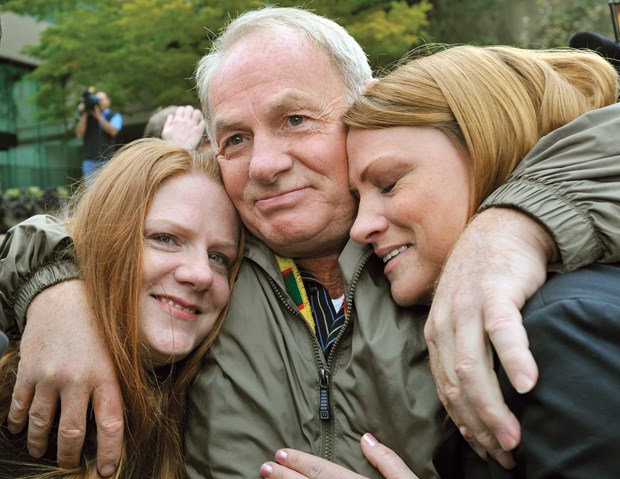A lawyer for a man who spent 27 years behind bars after being wrongfully convicted in a serial sexual assault case says his client and his family have been devastated by the wrongful actions of police and prosecutors.
In his opening statement Monday, John Laxton, representing Ivan Henry, told B.C. Supreme Court Chief Justice Christopher Hinkson his client’s central claim is that the Crown breached his right to disclosure prior to trial and that the Vancouver police negligently investigated the case.
Henry is also asserting that the federal government is to blame for failure to provide a meaningful review for Henry, who was convicted in 1983, designated a dangerous offender and jailed indefinitely.
“The consequences to Mr. Henry and his family have been devastating, and the honour and integrity of the judicial system has been seriously harmed,” Laxton told the judge.
“Mr. Henry now seeks compensation for the pain and suffering he has endured over these 33 years and for the pain and suffering that will continue for the next 20 years of his expected life.
“His release from custody did not release him from the demons that haunted him during his custody.”
Laxton said it was “open season” on Henry while he was in prison because other prisoners hold a low opinion of serial sex offenders.
Henry was effectively on “death row” during his 27 years behind bars, he said: “He never knew when his throat would be slit.”
Laxton said the case is unusual in that it was the first time that a wrongful conviction case in Canada has had to be brought before the courts. Previous cases have resulted in out-of-court settlements, he said.
“It will be a proceeding that should never have been necessary,” said Laxton. “We trust that your lordship’s judgment will provide such a damning condemnation of the treatment of
Henry that the government will think twice in the future before they embark on such a reckless disregard for a citizen’s rights.”
Laxton said it was especially troubling that the City of Vancouver defendants deny the fact of the wrongful conviction and still assert guilt in the face of overwhelming evidence to the contrary.
“It’s an approach that denigrates the value of the years of his life lost. It’s an approach that finds Henry’s life was of no value whatsoever.”
Regarding the police investigation, Laxton pointed to what he called a “farcical” lineup conducted after Henry’s arrest in 1982 following a series of sexual assaults against women.
Henry had the right to refuse to participate in the lineup and did refuse to participate, but was dragged yelling and screaming into the room and held in a choke hold by one officer, said Laxton.
“Anyone looking at that picture would know who the police suspected was the perpetrator,” said Laxton.
He said police pressured one of the female complainants into identifying Henry. He argued that one officer’s conduct was unprofessional, citing a letter from the complainant to the cop after Henry’s conviction.
In the letter, the complainant thanked the officer, retired detective William Harkema, for “fine efforts” that have brought a conviction and added that the cop is like her “guardian angel.”
“You have a very special place in my heart,” wrote the complainant, who cannot be identified due to a publication ban. “Take care of those blue eyes and don’t work too hard.”
Laxton said “oppressive and unethical” techniques were used by police to persuade the victim to identify Henry.
He said that the Crown failed to disclose important material, including the initial statements to police from the complainants, statements that contradicted the testimony of the victims at trial.
Henry was arrested in July 1982 and charged with three counts of rape, two counts of attempted rape and five counts of indecent assault in connection with a series of attacks on Vancouver women over a two-year period.
The assaults involved an assailant who broke into ground-floor and basement suites late at night.
Henry maintained his innocence while serving his sentence and filed countless appeals, motions and applications from prison, all of which were dismissed.
But following a review of sexual assaults, the criminal justice branch appointed special prosecutor Len Doust to investigate whether a miscarriage of justice had occurred in Henry’s case. The review showed that another man may have been responsible for at least some of the attacks.
In January 2009 the B.C. Court of Appeal finally agreed to reopen his case. He was released on bail in June 2009 and moved in with his daughter in North Vancouver.
Then in October 2010, the Court of Appeal quashed Henry’s convictions and entered acquittals after finding there wasn’t enough evidence to properly convict him.
The current trial, which was initially expected to hear from 200 witnesses including Henry, now is expected to hear from about 60 witnesses, said Laxton.
Henry and his daughter Tanya Olivares sat quietly in the packed public gallery during Laxton’s opening statement.
The trial continued Tuesday with Olivares testifying.



